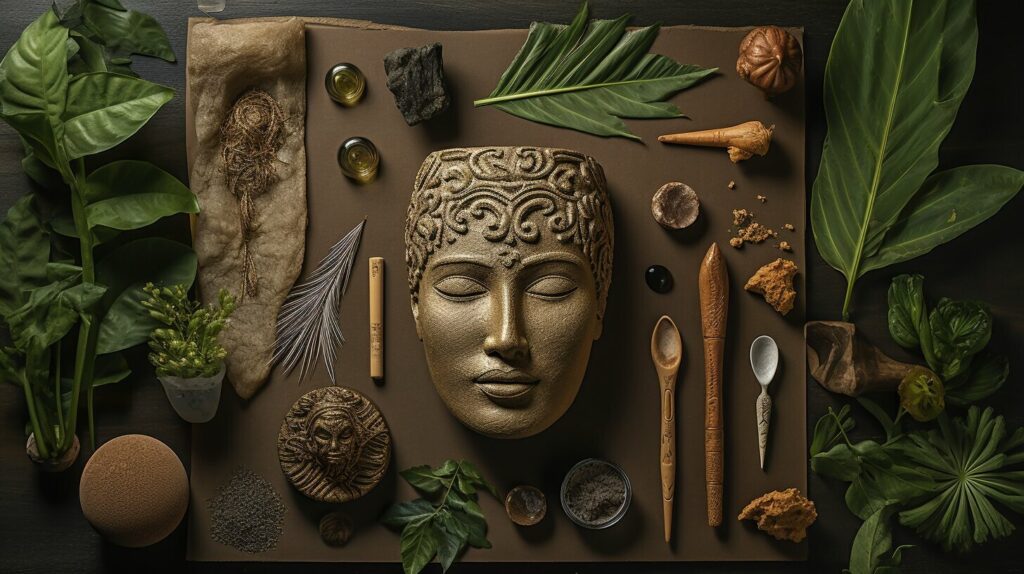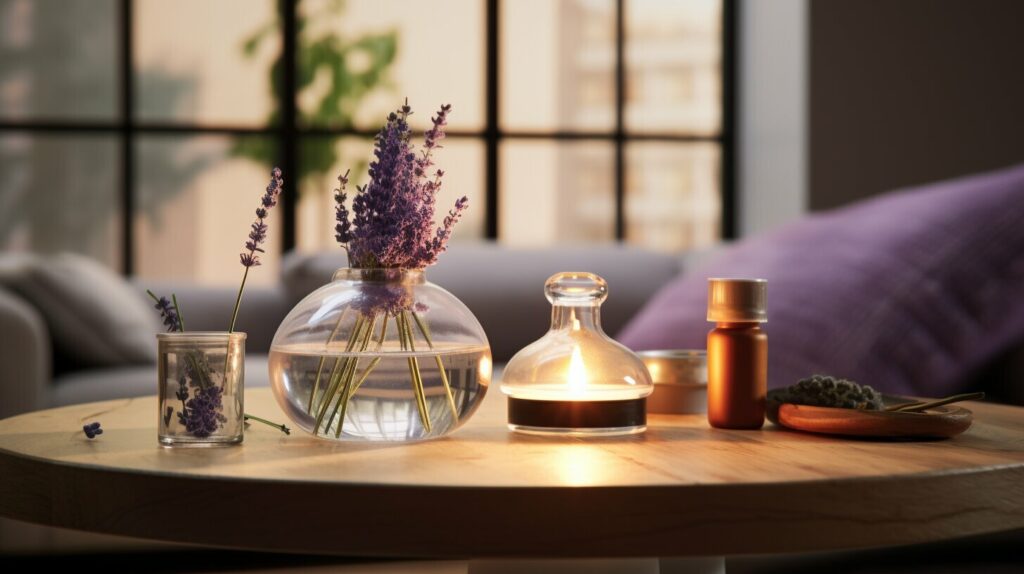Welcome to the world of aromatherapy and natural wellness. In this essential oils guide, we will explore how aromatherapy can help you achieve holistic well-being, experience natural healing, and enhance your overall wellness. By incorporating the power of essential oils into your daily routine, you can unlock the incredible benefits they offer.
Key Takeaways:
- Aromatherapy uses essential oils to promote holistic wellness and natural healing.
- Essential oils are highly concentrated liquids derived from plants.
- Aromatherapy can help reduce stress, improve sleep, relieve muscle pain, and enhance skincare.
- There are various ways to use essential oils, including inhalation, topical application, and adding to bathwater.
- Exploring different essential oils allows you to find the scents and therapeutic benefits that resonate with you.
What is Aromatherapy?
Aromatherapy is a practice that involves using essential oils derived from plants to improve overall well-being. Essential oils are highly concentrated liquids that contain the natural properties and scents of specific plants. When used in aromatherapy, these oils can have therapeutic benefits, such as reducing stress, improving sleep, relieving muscle pain, and enhancing skincare.
Aromatherapy is based on the principle that the scents of essential oils can stimulate receptors in the nose, which then send signals to the brain, impacting emotions and promoting relaxation. The oils can also be absorbed through the skin during massage or added to bathwater for a soothing experience.
There are various essential oils used in aromatherapy, each with its own unique properties and benefits. Lavender, for example, is known for its calming and sleep-inducing properties, while peppermint is often used to relieve headaches. Eucalyptus can help ease congestion, and chamomile promotes relaxation. By incorporating aromatherapy into your daily routine, you can experience the therapeutic benefits of these essential oils and enhance your overall well-being.

“The scents of essential oils can stimulate receptors in the nose, which then send signals to the brain, impacting emotions and promoting relaxation.”
Section 3: The History of Aromatherapy
Aromatherapy has a rich history that spans thousands of years. It has been embraced by various ancient civilizations for its natural healing properties and therapeutic benefits.
The Egyptians, renowned for their advanced knowledge of medicinal plants, used essential oils in religious rituals, cosmetics, and embalming practices. They recognized the power of aromatic plants to promote physical and spiritual well-being.
The Greeks and Romans also valued aromatherapy. They incorporated essential oils into their daily lives, using them for perfumes, massages, and in their bathhouses. The Romans even used essential oils to disinfect their homes and treat illnesses.
Over time, the practice of aromatherapy spread throughout Europe, with notable figures like Avicenna and Paracelsus contributing to its development. However, it wasn’t until the 20th century that French chemist René-Maurice Gattefossé coined the term “aromatherapy” and established the modern foundations of this holistic healing practice.
The History of Aromatherapy
| Ancient Civilizations | Major Contributions |
|---|---|
| Egyptians | Recognized the healing properties of essential oils and incorporated them into religious rituals, cosmetics, and embalming practices. |
| Greeks and Romans | Used essential oils in perfumes, massages, and bathhouses for their therapeutic benefits. |
| 20th Century | René-Maurice Gattefossé coined the term “aromatherapy” and established the modern foundations of the practice. |
Today, aromatherapy continues to be embraced as a natural and holistic approach to well-being. Its rich history reminds us of the enduring power of essential oils in promoting health and wellness.

Benefits of Aromatherapy
Discover the numerous benefits that aromatherapy and essential oils can bring to your overall well-being. Incorporating these natural remedies into your daily routine can promote relaxation, relieve stress, and enhance your mood. Let’s explore the incredible therapeutic benefits of aromatherapy:
- Relaxation: One of the key benefits of aromatherapy is its ability to induce relaxation. Essential oils like lavender, chamomile, and ylang-ylang have calming properties that can help reduce anxiety, promote better sleep, and create a sense of tranquility in your daily life.
- Stress Relief: In today’s fast-paced world, stress has become a common part of our lives. Aromatherapy offers a natural way to manage stress and its negative effects. Essential oils such as bergamot, frankincense, and clary sage have been found to reduce stress levels, improve mood, and promote emotional well-being.
- Improved Mood: Essential oils have the power to uplift your mood and boost your overall sense of well-being. Citrus oils like lemon, orange, and grapefruit are known for their invigorating and energizing properties. They can help improve focus, increase productivity, and create a positive atmosphere in your living or working space.
- Pain Relief: If you’re dealing with muscle aches or headaches, certain essential oils can provide effective relief. Peppermint oil has analgesic properties that can help soothe headaches and migraines, while eucalyptus oil is commonly used for relieving muscle and joint pain. Incorporating these oils into your massage routine or using them topically can provide targeted relief.
“Aromatherapy offers a natural and holistic approach to wellness, harnessing the power of nature to promote relaxation, relieve stress, and improve overall well-being.”
By incorporating aromatherapy and essential oils into your daily life, you can unlock a world of wellness and experience the incredible benefits they have to offer. Whether you choose to use essential oils in a diffuser, add them to your bath, or apply them topically, their therapeutic properties can have a profound impact on your physical and mental health. Begin your journey towards holistic wellness today and enjoy the transformative effects of aromatherapy.

Aromatherapy and Natural Healing: How to Use Essential Oils
Welcome to the world of aromatherapy and natural healing! If you’re looking to enhance your well-being and unlock the therapeutic benefits of essential oils, you’ve come to the right place. In this section, we’ll explore different ways to use essential oils for aromatherapy and provide some important tips to ensure safe and effective usage.
Methods of Application
There are several ways to incorporate essential oils into your daily routine. One popular method is inhalation, which can be done using a diffuser or by simply adding a few drops of oil to a tissue or cotton ball. Inhaling the aromatic scents can help promote relaxation, relieve stress, and improve your overall mood.
Another option is topical application. However, it’s crucial to dilute essential oils with a carrier oil, such as coconut or jojoba oil, before applying them to your skin. This helps prevent skin irritation or sensitivity. Massage the diluted oil onto your skin, paying attention to areas of concern or tension. Remember to perform a patch test on a small area of skin before applying it to a larger area.
Lastly, you can enjoy the benefits of essential oils by adding them to your bathwater. Create a soothing and aromatic experience by adding a few drops of your favorite oil into warm bathwater. Take your time to relax and let the oils work their magic as you soak in the therapeutic goodness.
Tips for Safe Usage
When it comes to using essential oils, it’s important to prioritize safety. Keep the following tips in mind:
- Research and choose high-quality essential oils from reputable brands to ensure purity and effectiveness.
- Follow recommended dilution ratios to avoid skin irritation. The general guideline is 2-3 drops of essential oil per teaspoon of carrier oil.
- Store essential oils in dark glass bottles away from direct sunlight to preserve their potency.
- Avoid ingesting essential oils, as they are highly concentrated and can be toxic if consumed improperly.
- Consult with a qualified aromatherapist or healthcare professional if you have any underlying health conditions or are pregnant or breastfeeding.
By following these guidelines, you can safely incorporate essential oils into your wellness routine and experience their natural healing benefits.

Summary
Essential oils offer a natural and holistic approach to wellness through aromatherapy. By using methods like inhalation, topical application, and adding them to your bath, you can unlock their therapeutic benefits and promote relaxation, stress relief, and overall well-being. Remember to choose high-quality oils, dilute them properly, and prioritize safety. Start your journey with essential oils today and discover the transformative power of natural healing.
Exploring Different Essential Oils
When it comes to aromatherapy, the world of essential oils is vast and diverse. Each oil offers unique therapeutic benefits and aromatic scents that can enhance your well-being. Whether you’re seeking relaxation, invigoration, or mood enhancement, there’s an essential oil for every need. Here are a few key oils to explore:
1. Lavender
Lavender oil is widely renowned for its calming properties. Its soothing scent promotes relaxation and helps alleviate stress and anxiety. Lavender oil is often used to aid with sleep, making it an excellent choice for those looking for a natural way to unwind and achieve a peaceful night’s rest.
2. Peppermint
Peppermint oil is known for its refreshing and invigorating properties. Its cool and minty aroma can help boost energy, improve focus, and relieve headaches. Peppermint oil can also aid digestion and provide relief from muscle tension or discomfort.
3. Lemon
Lemon oil is known for its uplifting and mood-enhancing effects. Its citrusy scent can help uplift your spirits, improve mental clarity, and increase concentration. Lemon oil is also believed to have detoxifying properties, making it a popular choice for enhancing overall well-being.
4. Eucalyptus
Eucalyptus oil is commonly used for its respiratory benefits. Its refreshing aroma can help ease congestion, clear the sinuses, and promote easier breathing. Eucalyptus oil is also known for its antibacterial properties, making it a valuable addition to your wellness routine.
5. Bergamot
Bergamot oil has a delightful citrusy scent with floral undertones. It is often used to promote relaxation, relieve stress, and uplift the mood. Bergamot oil can also help with skin conditions, such as acne or oily skin, making it a versatile oil for both emotional and physical well-being.
These are just a few examples of the many essential oils available for aromatherapy. Remember to always choose high-quality oils and do a patch test before using them topically. Explore the world of essential oils, experiment with different scents, and discover the ones that resonate with you and your wellness goals.

Summary
Aromatherapy offers a diverse range of essential oils that can enhance your well-being through their therapeutic benefits and aromatic scents. Lavender promotes relaxation and sleep, peppermint invigorates and relieves headaches, lemon uplifts and improves clarity, eucalyptus eases congestion and has antibacterial properties, and bergamot relaxes and uplifts. Experiment with different essential oils to find the ones that align with your wellness goals and enjoy the natural benefits they provide.
Conclusion
Congratulations on embarking on your wellness journey with aromatherapy and essential oils! By incorporating these natural remedies into your daily routine, you can experience a profound positive impact on your well-being.
Aromatherapy, with its therapeutic benefits, offers a holistic approach to healing and relaxation. The powerful scents of essential oils can help to reduce stress, improve your mood, and promote deep relaxation. These natural remedies have been trusted for centuries and continue to be valued for their ability to enhance overall wellness.
Whether you’re seeking relief from muscle pain, better sleep, or a mood boost, there is an essential oil suited for your needs. Lavender, chamomile, and ylang-ylang are perfect for relaxation, while invigorating scents like peppermint, eucalyptus, and tea tree oil can provide a refreshing experience. Uplifting oils such as lemon, grapefruit, and bergamot can brighten your mood and energize your day.
Take the time to explore the vast array of essential oils available and find the ones that resonate with you. Remember, essential oils are highly concentrated and should be used with care. Proper research or consulting with a professional can help ensure their safe and effective use on your wellness journey.
FAQ
What is aromatherapy?
Aromatherapy is a practice that involves using essential oils derived from plants to improve overall well-being.
What are essential oils?
Essential oils are highly concentrated liquids that contain the natural properties and scents of specific plants.
What are the benefits of aromatherapy?
Aromatherapy offers a wide range of benefits, such as promoting relaxation, reducing stress, improving mood, and addressing specific concerns.
How can I use essential oils for aromatherapy?
Essential oils can be inhaled through diffusers, added to bathwater, or applied topically when diluted with a carrier oil.
Which essential oils should I use for relaxation?
Lavender, chamomile, and ylang-ylang are popular choices for relaxation.
Which essential oils are known for their refreshing properties?
Peppermint, eucalyptus, and tea tree oil are often used for their refreshing and invigorating effects.
Can essential oils improve my mood?
Yes, essential oils like lemon, grapefruit, and bergamot are known for their uplifting and mood-enhancing effects.
Are there any precautions when using essential oils?
Yes, essential oils are highly concentrated and should be used with caution. It’s recommended to do proper research or consult with a professional before using essential oils.
